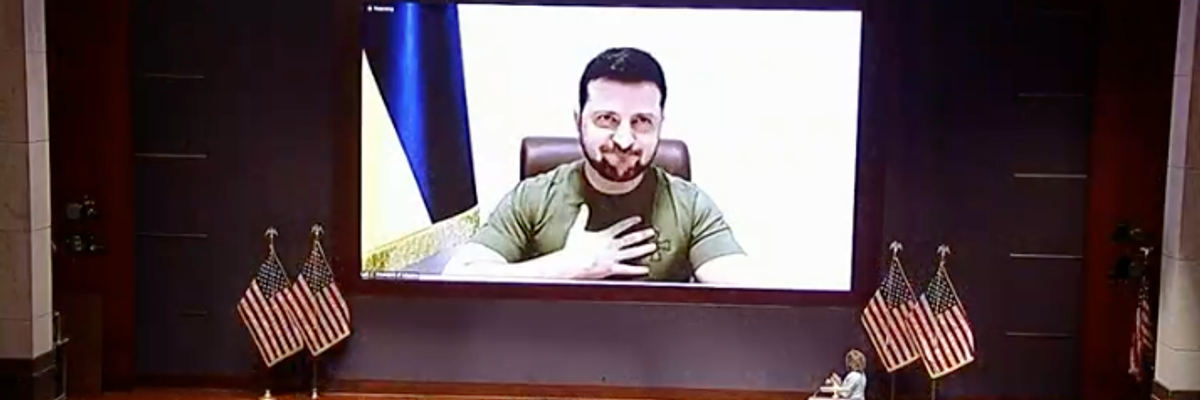A bipartisan group of hawks in Congress announced a new resolution on Tuesday that calls for the U.S. to seek the restoration of Ukraine’s 1991 borders and to bring Ukraine into NATO after the war is over.
Reps. Joe Wilson (R-S.C.) and Steve Cohen (D-Tenn.) are co-sponsoring what they call the Ukrainian Victory Resolution, and have been framing it, perhaps not surprisingly, with the lofty rhetoric of World War II. So far the bill has 18 bipartisan co-sponsors.
“We must not repeat the error of Sept. 1, 1939,” Wilson told Yahoo News, referencing what is now held by many as the “Munich moment” and appeasement of Adolf Hitler before the Nazi invasion of Poland.
Senators Lindsey Graham (R-S.C.), Sheldon Whitehouse (D-R.I.), and Richard Blumenthal (D-Conn.) have also introduced their own, similar resolution in the Senate. This comes after three Senators and 16 House Republicans last week sent a letter to President Biden saying they would not support any new Ukraine aid if it was not paired with a clear diplomatic strategy to end the war.
This week's resolutions are sure to stir debate over the extent of U.S. Ukraine policy and support ahead of an expected Ukrainian counteroffensive this spring. Furthermore, a signal from Congress that the U.S. is fully behind the retaking of Crimea and the Donbas would be exactly what the Ukrainian government wants to hear, but it is a dangerous message to send when Ukraine lacks the ability to achieve those goals on the ground.
In fact, setting overly ambitious, unrealistic goals as the definition of “victory" seems more likely to blow up in the faces of both Washington and Kyiv. Instead of backing war aims that promise to prolong the conflict, the U.S. should be encouraging Ukraine to settle for a return to the pre-2022 lines.
It remains an open question whether Ukrainian forces will be able to make any significant advances this year. According to the Discord leaks, the Pentagon expects that the war will be a stalemate for the rest of 2023. It is doubtful that Ukraine will be able to recapture any of the territories lost to Russia in 2014, and it is irresponsible to endorse those goals when that promises to drag out the war much longer to no one’s benefit.
Another danger is that endorsing these goals could draw the U.S. closer to direct intervention as a means of achieving them. There is also the risk that attempting to recapture Crimea could provoke Russian escalation, up to and including the use of nuclear weapons.
Thomas Meaney of the Max Planck Society in Germany warned several weeks ago that Ukraine could only achieve “complete victory” with direct U.S. and NATO involvement in the war: “Absent NATO involvement, the Ukrainian Army can hold the line and regain ground, as it has done in Kharkiv and Kherson, but complete victory is very nearly impossible.”
While top Ukrainian officials insist that they aren’t demanding that U.S. and allied troops fight for them, that is likely what would be required to fully recapture all lost Ukrainian territories. Since the U.S. and its allies must not enter the war directly, no Western governments should be encouraging Ukraine to seek its most ambitious goals.
Ambitious war aims guarantee a long war, and a long war is not in U.S. interests. The Rand Corporation’s Samuel Charap and Miranda Priebe concluded at the end of their paper on this question, “Territorial control, although immensely important to Ukraine, is not the most important dimension of the war's future for the United States. We conclude that, in addition to averting possible escalation to a Russia-NATO war or Russian nuclear use, avoiding a long war is also a higher priority for the United States than facilitating significantly more Ukrainian territorial control.” U.S. and Ukrainian interests aren’t identical, and U.S. policy should reflect that. The “victory” resolution ignores this.
It is understandable that the Ukrainian government wishes to reverse all Russian territorial gains, but that has to be weighed against the likely costs that pursuing those goals will incur. The U.S. needs to be cautioning Ukraine against riskier courses of action that could lead to major defeats and possible military collapse. It would hardly help Ukraine’s cause to cheer them on in pursuit of an impossible goal and then see it backfire on them.
The good news is that the resolutions are symbolic and can’t force the Biden administration to do anything, but they will still put pressure on the administration to endorse the same unrealistic goals and it could box Biden in politically. If passed, they will bolster hardliners in Washington and Kyiv and encourage them to increase demands on the U.S. and its allies. Egging on hardliners is the opposite of what the U.S. needs to be doing.
If the Ukrainian government is going to accept settling for less than the full recapture of lost territories, the U.S. will have to use pressure and it will have to be seen using that pressure on Kyiv. As the Quincy Institute’s Anatol Lieven explained in an article earlier this month, “All the Ukrainian analysts with whom I spoke agreed that only intense public pressure from Washington could allow Zelensky to agree to a territorial compromise—even if Zelensky himself felt compelled to respond to the pressure in public with bitter protest.”
It remains to be seen if the Biden administration is willing to endure the political backlash that any effort to pressure Ukraine would trigger, but that is what will need to happen to provide the Ukrainian government with cover to consider something less than “complete” victory.
















